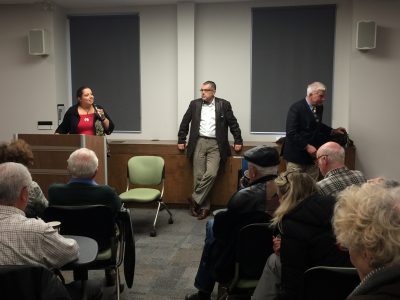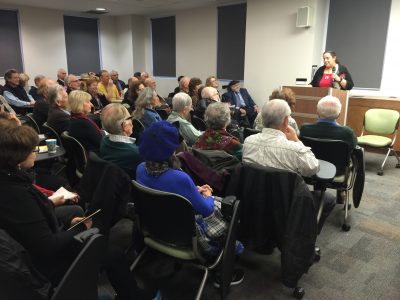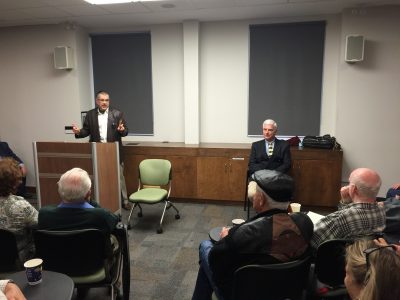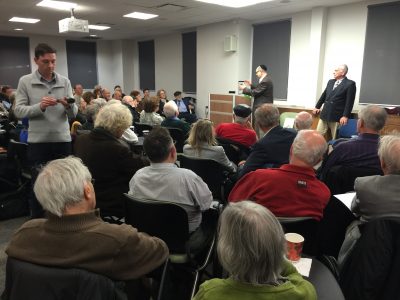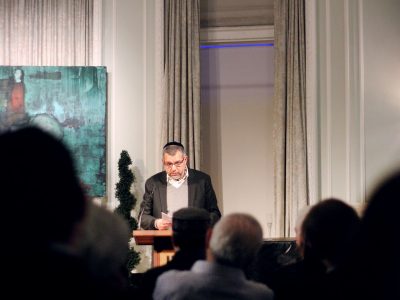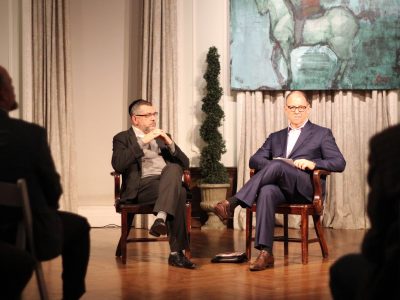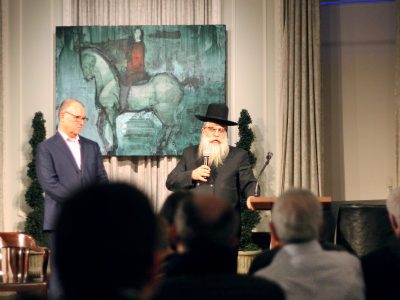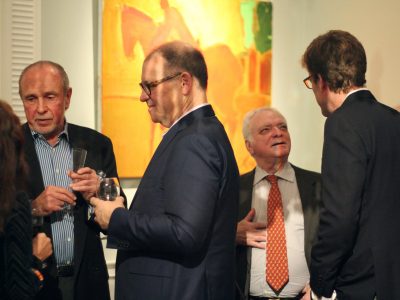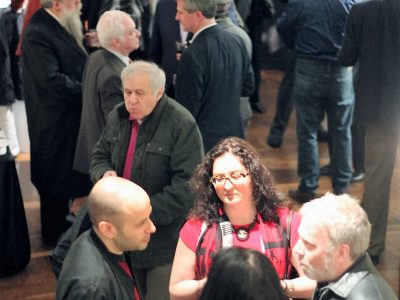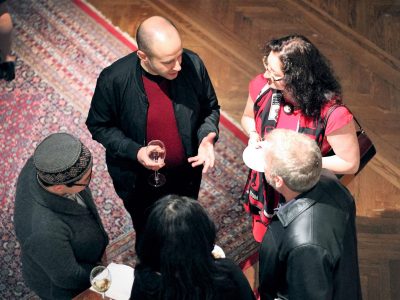Jews and Ukrainians: Examining A Shared Narrative
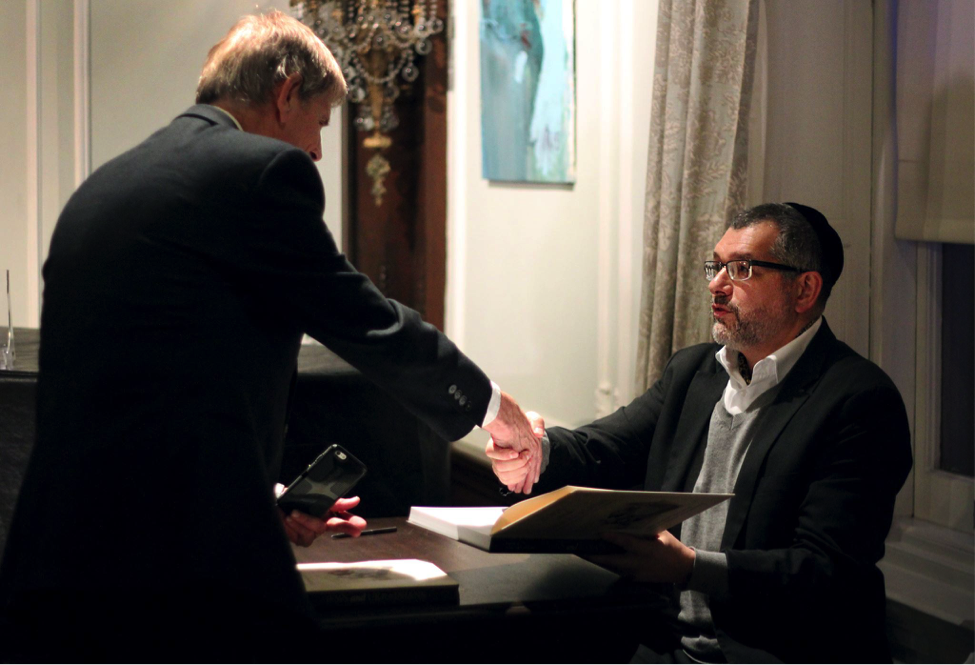
Although they have lived side by side for over a millennium on the territory of modern day Ukraine, there is much Ukrainians and Jews do not know about each other. That has frequently led to misperception, biases and stereotypes, some solidified over the centuries.
A newly published book, Jews and Ukrainians: A Millennium of Co-Existence, is an effort to bridge the knowledge gap and to show the two communities that they are more similar than different.
“Jews and Ukrainians is an attempt to overcome mutual ignorance, provide some basic knowledge, and bring Jews and Ukrainians together for a conversation,” Professor Yohanan Petrovsky-Shtern, one of the book’s authors, said at two recent North American book appearances. “Not only does the book tell Jews about Ukrainians and Ukrainians about Jews: it tells Jews about Jews and Ukrainians about Ukrainians.”
The book is co-authored by Dr. Petrovsky-Shtern, who is The Crown Family Professor of Jewish Studies at Northwestern University, and Professor Paul Robert Magocsi, Chair of Ukrainian Studies at the University of Toronto.
Divided into 12 chapters, the book covers the intricate relationship of Jews and Ukrainians in twelve thematic chapters devoted to history, economics, culture, religion, and contemporary issues. Commission by the Ukrainian Jewish Encounter, the illustrated 320-page volume is available from the University of Toronto Press.
Dr. Petrovsky-Shtern was in New York and Toronto on November 7 and Oct. 26-27 respectively to promote this groundbreaking effort and to explain why it is important, addressing areas of sameness, difference and unfamiliarity between the two communities that lived side-by-side on the territory of modern-day Ukraine.
One hope is that the book will be a first step in breaking long-held stereotypes and to spur a discussion between the two communities.
“Understanding difference requires something more than received wisdom. Most Jews know about Ukrainians precisely what Ukrainians know about Jews: received wisdom, that is, stereotypes,” Dr. Petrovsky-Shtern said. “Stereotypes are not only misleading—they are dangerous as they govern people’s decision making. Questioning stereotypes thus influences what people do in the realm of everyday life—and in politics. Questioning makes people revisit their patterns of behavior and modes of thinking.”
In his lectures in both cities, Dr. Petrovsky-Shtern argued that Ukrainians and Jews know as little about themselves as they know about each other.
“The ignorance on both sides is astounding,” he said. “Jews do not know that Ukraine was home to great rabbinic scholars, Hebrew and Yiddish writers, and major Jewish thinkers and politicians, to ideas and concepts that govern Jewish life to the present day. Ukrainians do not know that Jews made Ukrainian villages into towns and towns into cities, developed the Ukrainian market economy, and inspired key Ukrainian thinkers to think differently about Ukraine.”
Dr. Petrovsky-Shtern noted that the lack of knowledge has led to many misperceptions that should be repudiated.
“The person who says that Ukrainians were killing Jews during World War II is as ignorant as the person who says that Jews brought Communism to Ukraine,” he said.
“A historian begins with questions challenging generalizations. You are saying that Ukraine was a land of martyrdom for the Jews. Why then, was it home to a quarter of world Jewry and why did Jews keep moving until the end of the 19th century to Ukraine, and not out of it? Ukrainian nationalists were allegedly staunch antisemites: how about Yaroslav Dashkevych, Myroslav Marynovych, Yevhen Sverstiuk, Zinovii Antoniuk, all accused by the Soviet regime of Ukrainian nationalism. Why did these people champion Ukrainian-Jewish rapprochement and defend the Jews as an ethnic group with a unique culture to the xenophobic Soviet authorities? Why were they the very people who inspired assimilated Jewish dissidents in the gulag to look at themselves as representatives of Ukraine’s Jews with a strong national democratic agenda?”
Dr. Petrovsky-Shtern argued that one of the experiences shared by both communities is that both peoples, more often than not, were agents of someone else’s colonialism, as well as their victims.
“Quite often, Ukrainians and Jews were hideously turned against one another and commissioned, so to speak, to produce mutual hatred. Nevertheless the cultural elites of the two peoples, and also ordinary Ukrainians and Jews, managed to build solid relations that challenged this imposed hatred,” he said.
Looking at contemporary Ukraine, Dr. Petrovsky-Shtern noted that during the last 25 years of Ukrainian independence, both Ukrainians and Jews in Ukraine have revolutionized their self-understanding.
“The existence of the State of Israel has played a formidable role in this revolutionary process,” he said. “Both peoples, Ukrainians and Jews, realized that their attempt to know their own history, culture, religion, and language was at least frowned upon, and often simply suppressed. Both peoples regained their desire to explore their past—and to build a common future.”
Jews and Ukrainians: A Millennium of Co-Existence is published in the both the English and Ukrainian languages. The Valerii Padiak Publishing House in Ukraine published the Ukrainian-language volume, which was unveiled in September 2016 at the Lviv Book Forum. It was awarded special recognition as one of the forum’s best books by the Forum’s president, Oleksandra Koval.
Information on how to purchase the book can be found here.
All photos from Toronto book launch are by Natalia A. Feduschak.
All photos from New York book launch by Kasia Zabawka.
Watch a video of Professor Yohanan Petrovsky-Shtern speak in New York on Nov. 7, 2016, at the book launch of Jews and Ukrainians: A Millennium of Co-Existence. Video courtesy of the Ukrainian Institute of America.
Watch the full question and answer session following Professor Yohanan Petrovsky-Shtern’s presentation titled "What Ukrainians and Jews Know and What They Do Not Know About One Another", which was part of the unveiling of the book “Jews and Ukrainians: A Millennium of Co-Existence” at the University of Toronto on Oct. 26, 2016 in Toronto, Canada.







